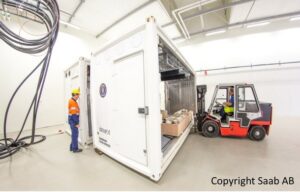
Whether it is the G20 in Brisbane in 2014, the World Cups in cricket and football, or the Olympic or Commonwealth Games, the organizers of these events are looking to leave a lasting legacy that can benefit the city long after the event has finished.
One simple way is by deploying a modular data center solution.
The modular nature of the Datapod data center system enables event organisers to deploy the infrastructure for the duration of the event, providing critical infrastructure associated with the Technology Operations Center, including IT systems and telecoms. The individual components of the Datapod modular data center can also be branded and rebranded enabling the brand of the event (and the post event user) to be extended further than before.
Then once the event has concluded the modular data center can be disassembled and reused at different location or for a different use.
The ability to reuse and reassemble the modular data center system provides stakeholders with a better return on investment and is an opportunity to leave a technological legacy that continues to benefit the local community long after the event has left town.
A good example is the 2016 Olympic Games in Rio De Janeiro or the 2018 Commonwealth Games on Australia’s Gold Coast. Both cities are determined to leave a lasting legacy that drives the economy forward.
A modular data center could be reassembled on a University Campus to provide critical data center infrastructure for a research institute or as critical infrastructure for local governments to deliver better online outcomes associated with the emerging pressures of big data.
Datapod Head of Marketing Communications Gordon Watson said, “The modular nature of the Datapod data center system is a tangible opportunity for event organizers to leave a technological legacy that will continue to drive the host’s economy forward long after the event is over. With the global modular data center market is predicted to reach over $40billion by 2018, it is only a matter of time before organizers of large events like World Cups and International Games begin leveraging from the ongoing benefits that can be provided by a modular data center solution.”
London understands the importance of leaving a legacy and the role of technology.
London is in the process of successfully transforming a section of Queen Elizabeth Park into a data center facility that will support a burgeoning creative industry. The ‘bricks and mortar’ data center is due to open in 2015 and it is predicted the 140,000ft2 site will deliver £460m in GDP to the national economy and create more than 6,500 local jobs.
Mr Watson adds, “The Datapod solution would enable organisers to do more with less. And although the London project is different the underlying technological benefit to a host city is very clear.”
Computerweekly.com reported that during the London Games, the Technology Operation Center oversaw critical applications such as the Commentator Information System and the organisers’ intranet, as well as monitoring 900 servers, 1,000 network and security devices and 9,500 PCs. In total over 5,000 technology staff – including 2,500 volunteers were involved in the Olympics IT.